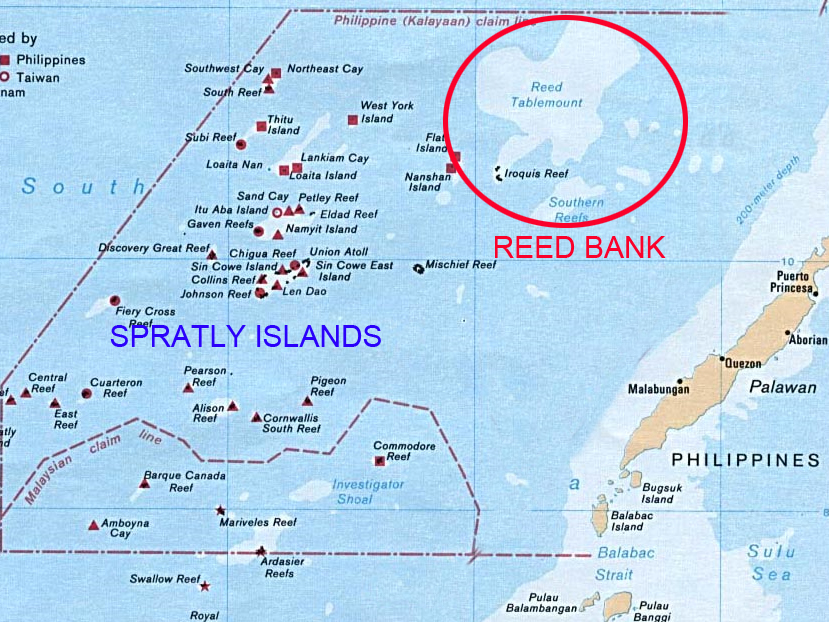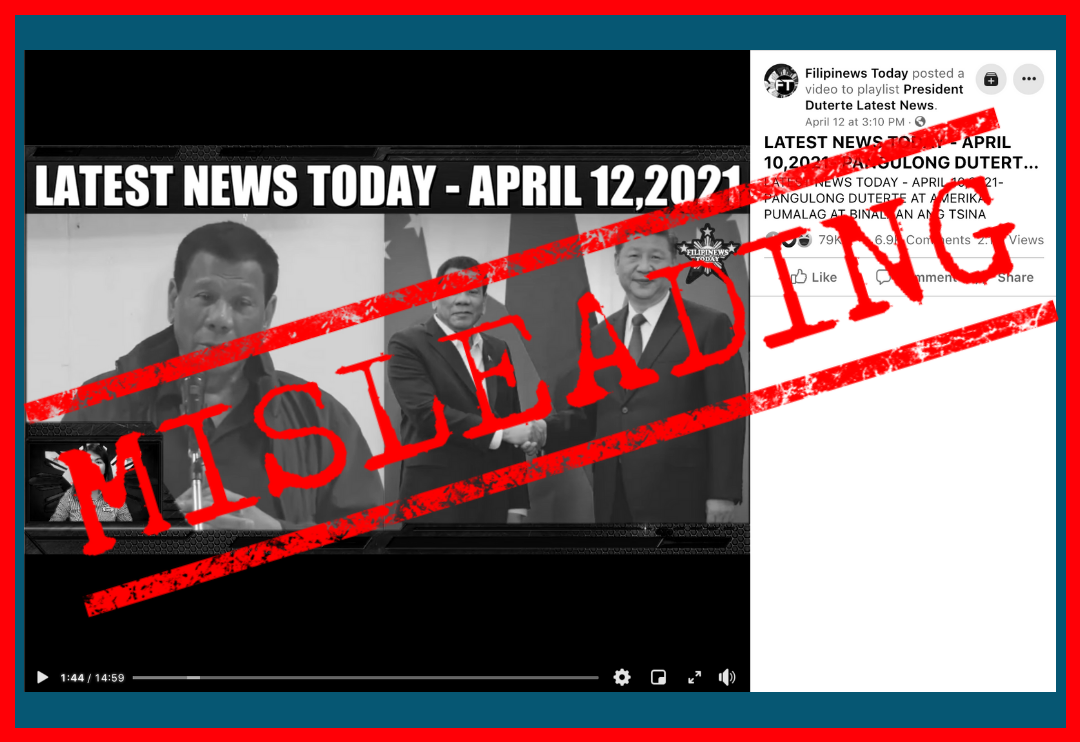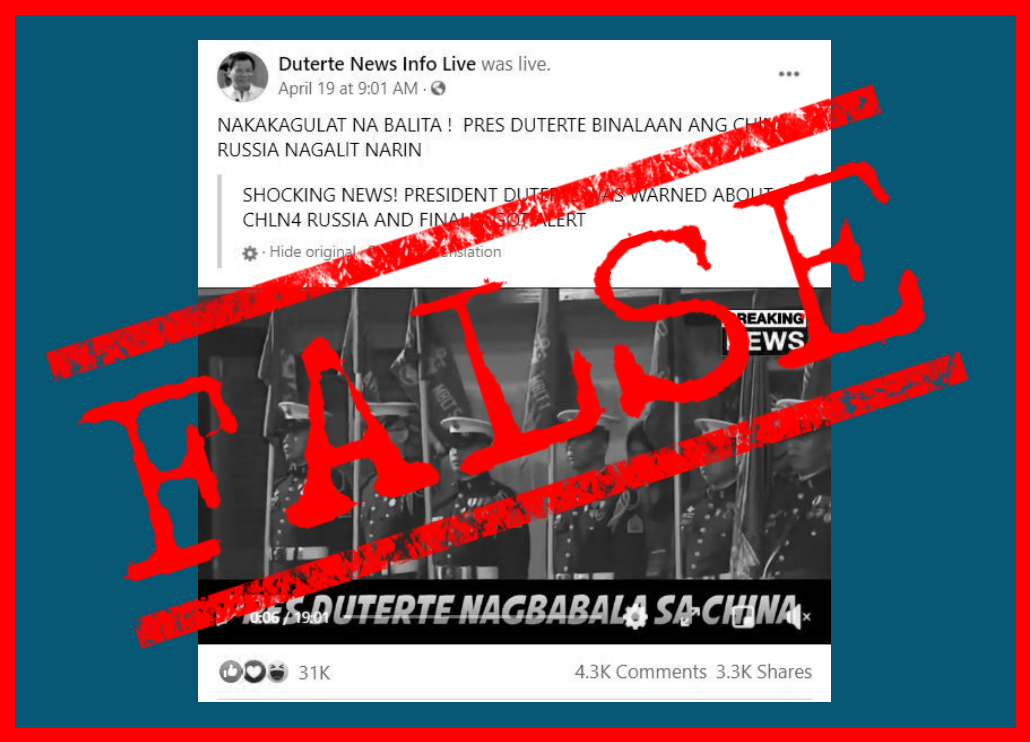President Rodrigo Duterte’s remark that he will “of course” allow Chinese fishermen to fish in the country’s exclusive economic zone (EEZ) violates the 1987 Constitution and at least two local laws.
STATEMENT
In a June 26 speech, Duterte took a swipe at Supreme Court Senior Associate Justice Antonio Carpio and opposition senators, who previously said the Constitution prohibits the Philippine government from allowing foreign nationals to fish within the country’s EEZ.
He said:
“Alam mo, gusto talaga nila ng gulo. Kasi sabi ko — tanong sila, (You know, they really want a mess. They asked me) ‘Will you allow the Chinese to fish?’ Sabi ko (I said) ‘Of course.’”
He added:
“Eh gusto nila i-prohibit ko (They want me to prohibit [China]). Why will I go there and prohibit them na (when) the only way to stop them is talagang gamitan mo ng ngipin ‘yan (really through the use of force)?”
Source: PCOO, Speech during the 122nd founding anniversary of Presidential Security Group, June 26, 2019, watch from 19:10 to 19:36 and 21:10 to 21:27
This was in the context of Duterte’s remark in a media interview where he said China would not allow itself to be barred from fishing within the country’s EEZ “because we’re (Philippines and China) friends.”
FACT
Duterte’s proposition directly violates the Philippine Charter, the Fisheries Code, and the archipelagic baselines law.
The 1987 Constitution, the highest law of the land, explicitly says:
“The State shall protect the nation’s marine wealth in its archipelagic waters, territorial sea, and exclusive economic zone, and reserve its use and enjoyment exclusively to Filipino citizens.”
Source: Official Gazette, The Constitution of the Republic of the Philippines – Article XII, Section 2
This is further reiterated in Republic Act 8550 or the Philippine Fisheries Code:
“The use and exploitation of the fishery and aquatic resources in Philippine waters (including the country’s EEZ) shall be reserved exclusively to Filipinos.”
Source: Official Gazette, RA 8550 – Chapter II, Section 5
Only research and survey activities “may be allowed” in the area, but will still be subject to “strict regulations” and will be done “purely for research, scientific, technological and education purposes that would also benefit Filipino citizens,” the law adds.
Section 87 of the Code further says:
“It shall be unlawful for any foreign person, corporation or entity to fish or operate any fishing vessel in Philippine waters. The entry of any foreign fishing vessel in Philippine waters shall constitute a prima facie evidence that the vessel is engaged in fishing in Philippine waters.”
If caught, poachers will ideally be fined $100,000 and will have their catch, fishing equipment and fishing vessel confiscated.
Similarly, section 3 of RA 9522 or the archipelagic baselines law affirms that the country has “dominion, sovereignty and jurisdiction over all portions of the national territory as defined in the Constitution and by provisions of applicable laws.”
The Constitution defines national territory to include the “territorial sea, the seabed, the subsoil, the insular shelves and other submarine areas” that the country has “jurisdiction” over.
The Permanent Arbitration Court (PCA) in 2016 ruled that certain areas in the South China Sea are within the EEZ of the Philippines. This includes the Reed Bank, where the allision involving an anchored Filipino fishing boat and a Chinese vessel took place on June 9. (See VERA FILES FACT CHECK: The evolving statements on the Recto Bank allision; a visual timeline)
However, under international law, foreign states may be allowed to fish within one’s EEZ
The United Nations Convention on the Law of the Sea (UNCLOS) says that a coastal State, like the Philippines, may give foreign States access to living resources in its EEZ, but the latter must comply with “conservation measures and other terms and conditions established in the laws and regulations of the coastal State.”
Article 2 Section 7 of the Philippine Constitution meanwhile states that in “relations with other states the paramount consideration shall be national sovereignty, territorial integrity, national interest, and the right to self-determination.”
Sources
Presidential Communications Operations Office, Speech during the 122nd founding anniversary of Presidential Security Group, June 26, 2019
Radio Television Malacañang, Media Interview after the Premiere Night of the Movie, ‘Kontradiksyon,’ June 24, 2019
Official Gazette, The Constitution of the Republic of the Philippines
Official Gazette, RA 8550
Official Gazette, RA 9522
Permanent Arbitration Court, PRESS RELEASE: The South China Sea Arbitration, July 12, 2016
Permanent Arbitration Court, South China Sea Arbitration Award, July 12, 2016
United Nations, UNCLOS Part V: Exclusive Economic Zone
United Nations, United Nations Convention on the Law of the Sea
VERA Files, Primer on the PH-China arbitration, July 12, 2016
(Guided by the code of principles of the International Fact-Checking Network at Poynter, VERA Files tracks the false claims, flip-flops, misleading statements of public officials and figures, and debunks them with factual evidence. Find out more about this initiative and our methodology.)




